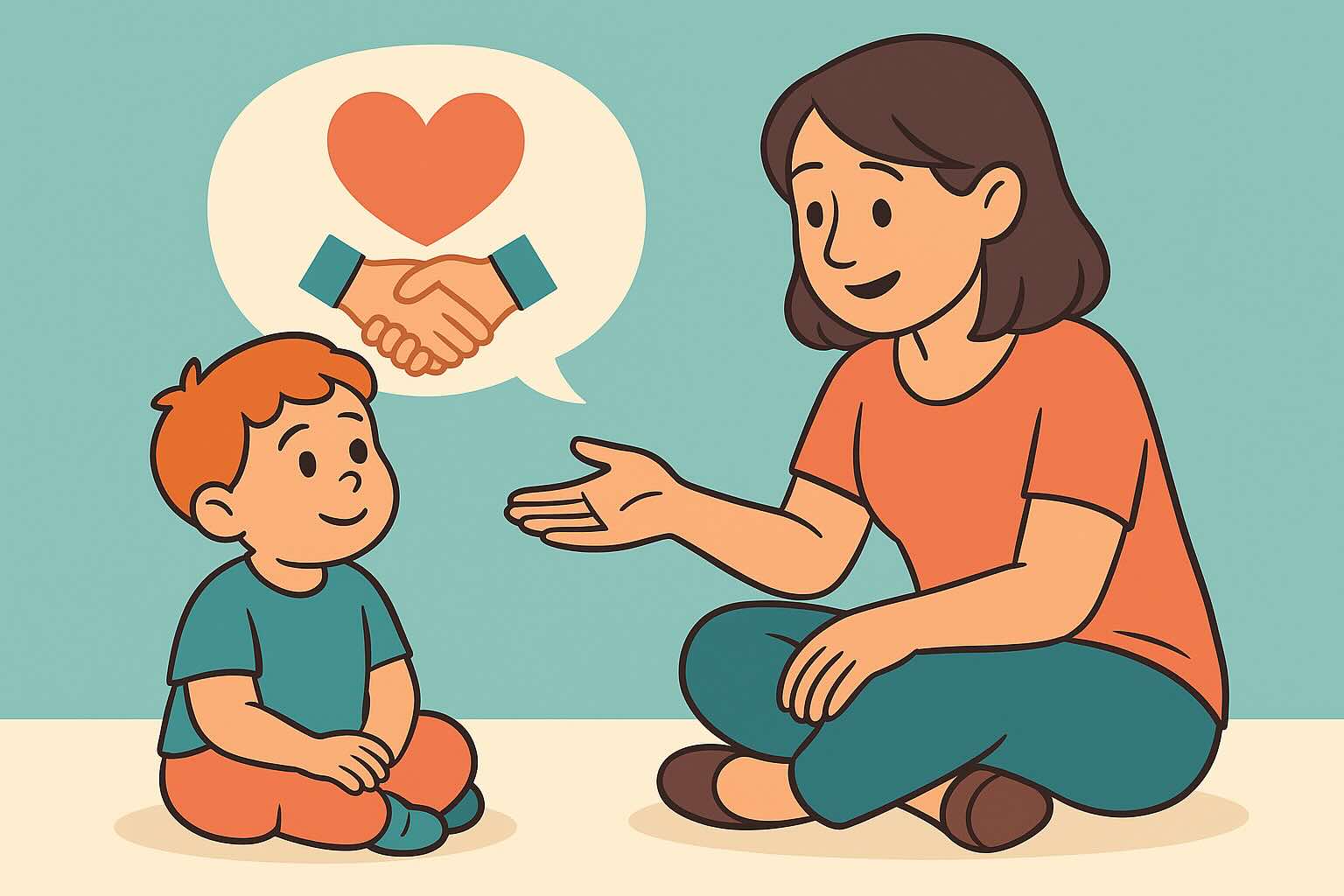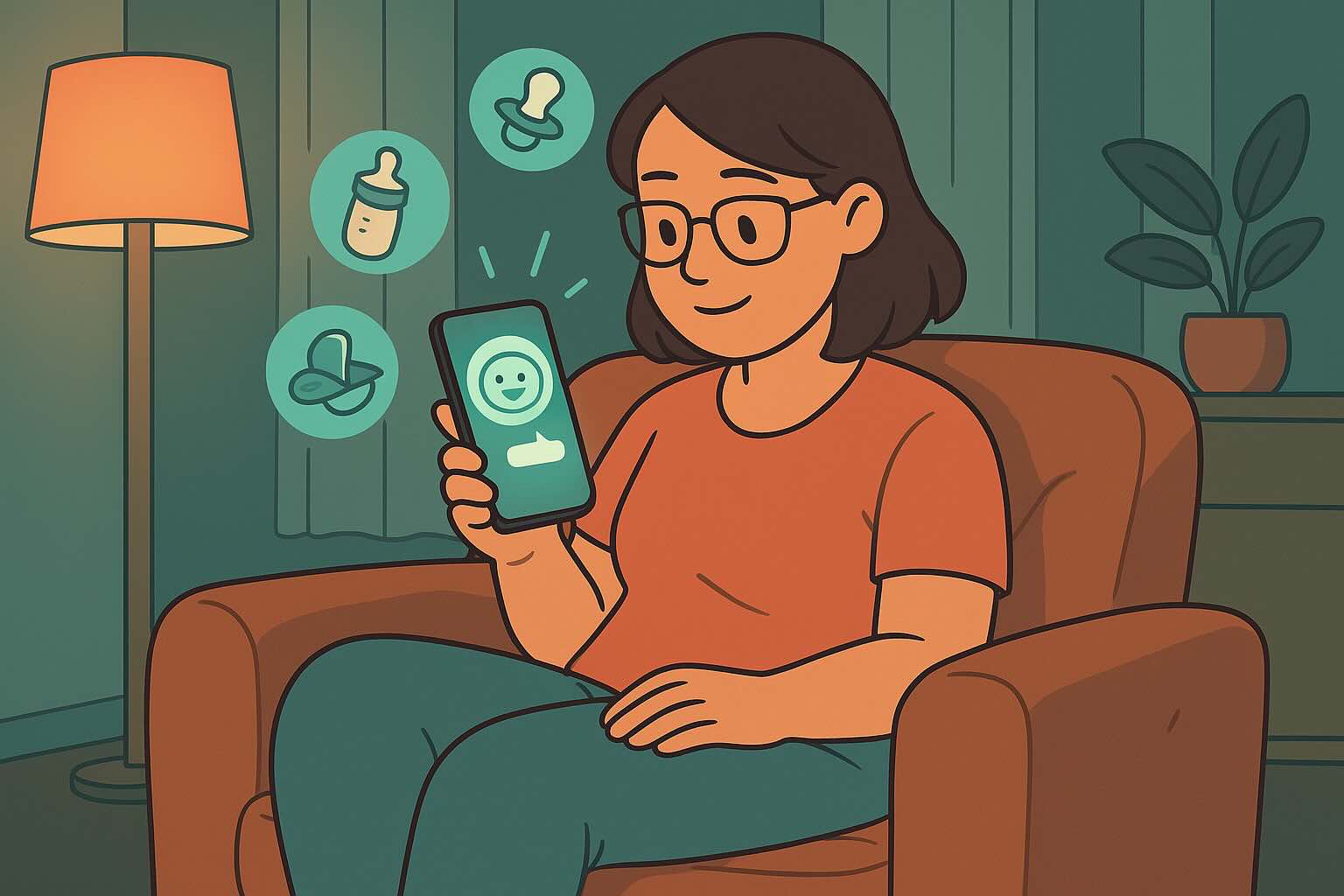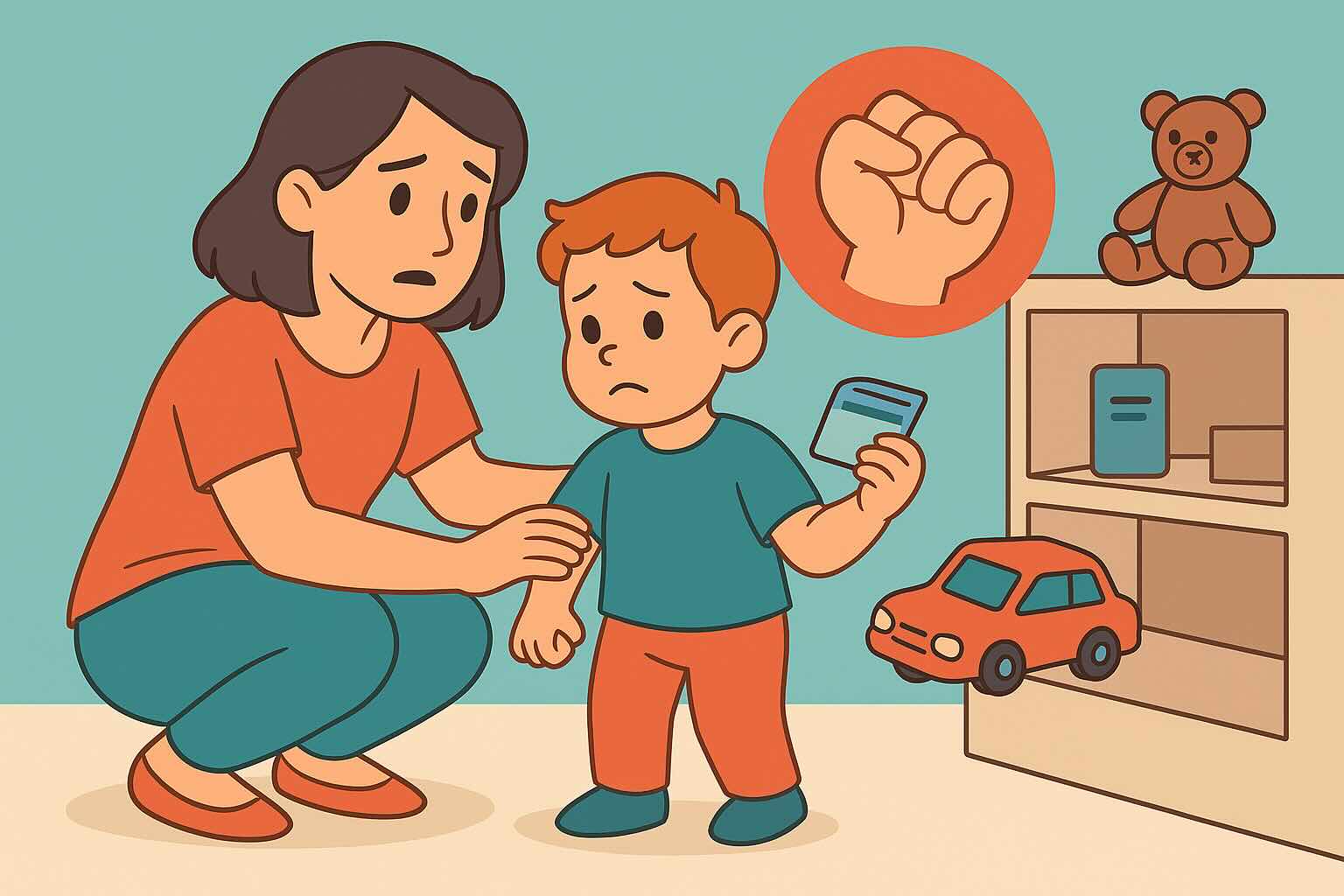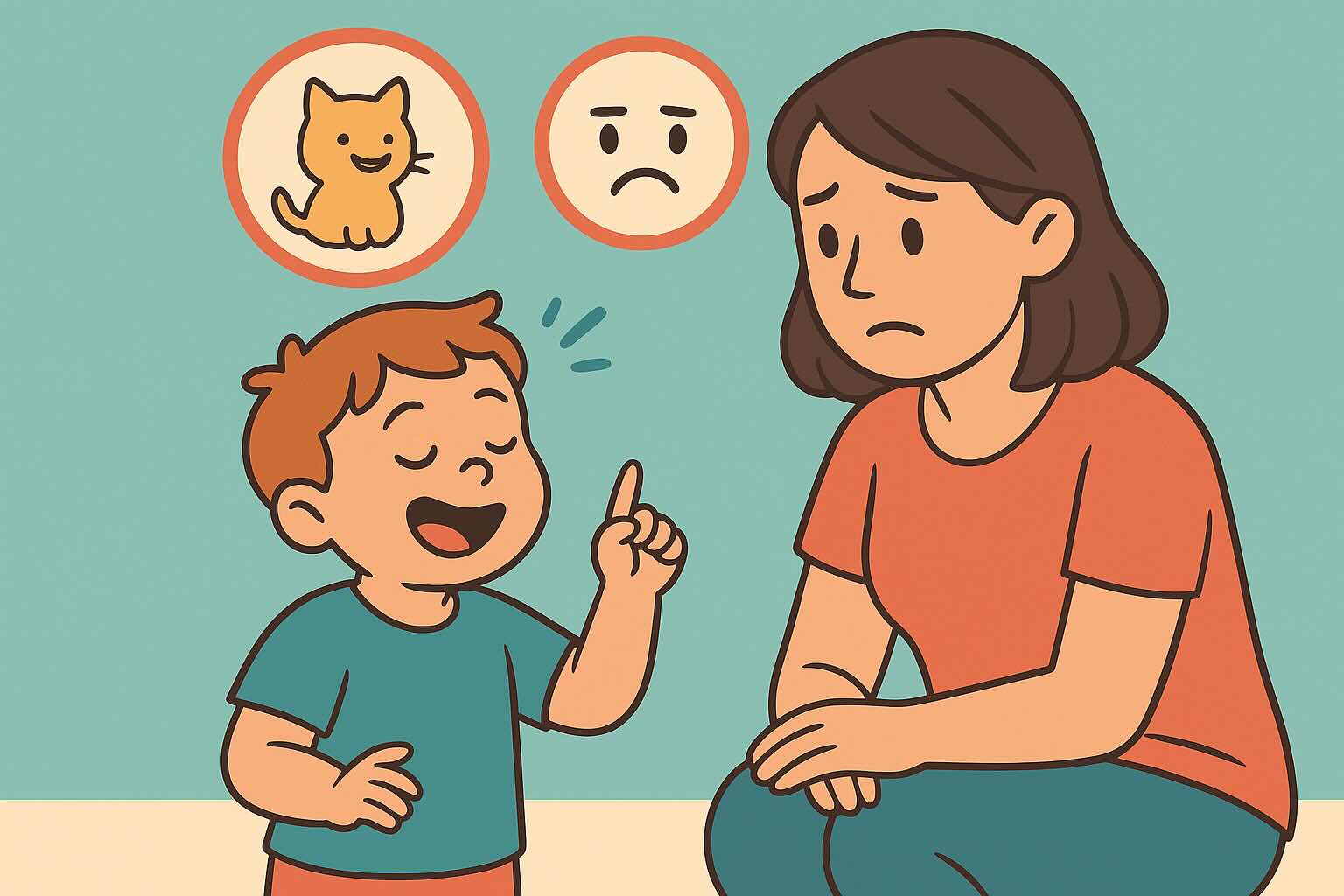Building Trust and Honest Communication: 5 Steps


The foundation of every strong parent-child relationship is trust and honest communication. When children feel emotionally safe to tell you the truth—even about mistakes, fears, or difficult situations—you create a relationship that will serve both of you for life. But building this level of trust doesn't happen automatically, especially after lying or trust-breaking incidents.
This comprehensive guide will show you how to create an environment where honesty feels natural and safe, where your child comes to you with problems instead of hiding them, and where trust grows stronger even through challenging moments. You'll learn practical strategies that work for children ages 3-7 and establish patterns that will benefit your relationship through the teenage years and beyond.
For specific situations involving lying, check out our complete response guide, and for understanding the development of honesty, see our why children lie guide. Also explore our guides on imagination vs lying and addressing stealing behavior.
Understanding Trust Development in Young Children
How Trust Forms in Ages 3-7
Young children's understanding of trust is concrete and based on patterns of experience:
What builds trust:
- Predictable, calm responses to both good and difficult news
- Feeling heard and understood when they share feelings
- Seeing that honesty leads to problem-solving, not punishment
- Experiencing repair when communication goes wrong
- Knowing that your love doesn't depend on their perfection
What breaks trust:
- Harsh reactions that make them regret telling the truth
- Promises broken without explanation or repair
- Feeling like they're "in trouble" for being honest about mistakes
- Inconsistent responses that make them unsure what to expect
- Shame-based reactions that attack their character rather than address behavior
The Trust-Honesty Cycle
Positive cycle: Child shares something difficult → Parent responds calmly → Child feels safe → Child shares more openly → Trust deepens
Negative cycle: Child shares something difficult → Parent reacts harshly → Child feels unsafe → Child hides information → Trust erodes
Breaking negative cycles: The good news is that children are remarkably forgiving and responsive to changes in your approach. You can break negative cycles and rebuild trust at any point by changing your responses consistently over time.
Creating Emotional Safety: The Foundation of Honest Communication
What Emotional Safety Feels Like for Children
From your child's perspective, emotional safety means:
- "I can tell Mom/Dad anything and they won't lose control"
- "When I make mistakes, we solve problems together"
- "My parents can handle my big feelings"
- "I'm loved even when I do things wrong"
- "My family is a safe place to be imperfect"
Building Emotional Safety Through Your Responses
To Difficult Truths
Instead of: "How could you do that?! I'm so disappointed!" Try: "Thank you for telling me, even though it was hard. Let's figure out what to do about this."
Instead of: "You should have known better!" Try: "It sounds like this was a tough situation. Help me understand what happened."
Instead of: "I can't believe you would lie to me!" Try: "I think you were worried about my reaction. I'm glad you're telling me the truth now."
To Mistakes and Problems
Instead of: "Why do you always...?" or "How many times do I have to tell you...?" Try: "Mistakes happen. What can we learn from this?" or "Let's figure out a better way to handle this next time."
Instead of: "You're in big trouble now!" Try: "This is a problem we need to solve together. What do you think we should do?"
To Big Emotions
Instead of: "Stop crying" or "You're being too sensitive" Try: "I can see this is really upsetting you. Tell me what's happening."
Instead of: "There's nothing to be afraid of" Try: "It sounds like you're feeling scared. That must be uncomfortable."
The Art of Emotional Regulation Modeling
Your emotional regulation teaches them that:
- Big feelings are manageable
- Adults can handle difficult information
- Problems can be solved calmly
- Relationships can weather challenges
Practical emotional regulation strategies:
- Take three deep breaths before responding to difficult news
- Use a calm, low voice even when you're feeling stressed
- Say: "I need a minute to think about this" if you're overwhelmed
- Model recovery: "I reacted strongly just then. Let me try again."
Daily Practices That Build Trust and Honesty
Morning Connection Rituals
Start each day with connection:
- "What are you looking forward to today?"
- "Is there anything you're worried about today?"
- "What would make today feel good for you?"
Create predictable positive attention:
- Special breakfast time together
- Five minutes of undivided attention before school
- Affectionate physical connection (hugs, snuggles) if your child enjoys it
- Positive affirmations: "I'm so glad you're my child"
Throughout-the-Day Check-ins
Casual connection moments:
- In the car: "Tell me the best part of your morning"
- During transitions: "How are you feeling right now?"
- At pickup: "What made you smile today?" (instead of "How was school?")
- During chores: Work together and chat casually
Make ordinary moments special:
- Really listen when they tell you about their interests
- Ask follow-up questions that show you care about their world
- Remember details they've shared and follow up later
- Show genuine interest in their perspective
Evening Reflection and Connection
Bedtime as relationship building time:
- "What was challenging about today?"
- "What are you proud of from today?"
- "Is there anything on your mind that you want to talk about?"
- "What made you feel happy today?"
Create safety for difficult topics:
- "Sometimes kids have things that worry them. I'm always here to listen."
- "If anything ever happens that makes you uncomfortable, you can always tell me."
- "There's nothing you could tell me that would make me stop loving you."
Weekly Family Meetings
Age-appropriate family discussions:
- Share highs and lows from the week
- Discuss any family challenges or changes coming up
- Practice problem-solving together on small issues
- Celebrate examples of honesty and good communication from the week
Sample family meeting structure (15-20 minutes):
- Each person shares something good from their week (5 minutes)
- Discuss any family issues that need attention (5 minutes)
- Plan something fun for the coming week (5 minutes)
- End with appreciations: each person says something they appreciate about someone else
Responding to Honesty in Ways That Encourage More
When They Tell You Difficult Truths
The immediate response framework:
Step 1: Thank them first
- "Thank you for telling me"
- "I'm glad you felt you could share this with me"
- "It took courage to tell me this"
Step 2: Pause before addressing content
- Take a breath to manage your own reaction
- Remember: their honesty is separate from the problem they're telling you about
- Focus on staying calm so they feel safe
Step 3: Address the issue constructively
- "Now let's figure out what to do about this"
- "How can we solve this problem together?"
- "What do you think would help with this situation?"
Celebrating Different Types of Honesty
For admitting mistakes:
- "Thank you for telling me you broke the lamp. Now we can clean it up together and figure out how to be more careful."
- "I appreciate you being honest about not doing your homework. Let's make a plan to get it done."
For sharing feelings:
- "Thank you for telling me you felt left out at school. That must have been hard to feel and hard to tell me."
- "I'm glad you could tell me you're angry about bedtime. It's okay to have those feelings."
For telling difficult truths about others:
- "Thank you for telling me that your friend was being mean. That was brave to speak up."
- "I'm proud of you for telling me about what happened at school. That helps me understand how to support you."
For correcting their own lies:
- "Thank you for deciding to tell me what really happened. That took courage to change your story."
- "I appreciate you coming back to tell me the truth. That shows you're growing."
Building Honesty Gradually
Start with small truths:
- Celebrate honesty about small things: "Thank you for telling me you didn't brush your teeth yet"
- Make it safe to admit minor mistakes: "Thanks for telling me you spilled something"
- Appreciate emotional honesty: "I'm glad you told me you felt frustrated"
Progress to bigger truths: As children experience safety with small honesty, they'll naturally begin sharing bigger things. Don't rush this process—trust builds gradually through many small positive experiences.
Teaching Age-Appropriate Honest Communication Skills
Ages 3-4: Foundation Building
Focus on basic emotional vocabulary:
- "I feel happy/sad/mad/scared"
- "I like this/I don't like this"
- "This is hard for me"
- "I need help"
Simple honesty concepts:
- "We tell people what really happened"
- "It's okay to make mistakes"
- "We can tell the truth even when it's hard"
- "Mommy and Daddy love you no matter what"
Practice through play:
- Use dolls or stuffed animals to practice telling the truth in pretend scenarios
- Read books about honesty and discuss the characters' choices
- Practice saying "I made a mistake" during play situations
Ages 4-5: Skill Development
Expanded emotional vocabulary:
- "I feel frustrated/disappointed/excited/worried"
- "I'm feeling confused about..."
- "I need some help with..."
- "I'm proud of myself for..."
More complex honesty situations:
- "It's okay to tell the truth even when you think someone might be upset"
- "We can tell people about our mistakes and ask for help fixing them"
- "Sometimes telling the truth helps other people too"
- "We can be honest and kind at the same time"
Role-playing scenarios:
- Practice telling a friend they hurt your feelings
- Practice admitting to an adult that you broke something
- Practice asking for help when something is hard
Ages 5-7: Advanced Communication
Nuanced emotional expression:
- "I'm feeling overwhelmed"
- "I'm proud of myself, but also nervous"
- "I'm disappointed, but I understand"
- "I'm angry about the situation, not at the person"
Complex honesty concepts:
- "Sometimes we tell the truth in private before we tell others"
- "We can be honest about our feelings without being hurtful"
- "It's brave to tell the truth when it's hard"
- "Honesty helps people trust each other"
Real-world practice:
- Encourage them to speak up when something doesn't feel fair
- Practice tactful honesty: "I don't enjoy that game" vs. "That game is boring"
- Help them navigate friendship conflicts with honesty and kindness
Modeling Honest Communication Yourself
Sharing Your Own Mistakes
Age-appropriate examples:
- "I forgot to put the clothes in the dryer this morning, so now we need to run them again"
- "I made a mistake at work today and had to talk to my boss about how to fix it"
- "I accidentally said something that hurt Daddy's feelings, and I apologized"
What this teaches:
- Everyone makes mistakes, even adults
- Honesty about mistakes is normal and healthy
- Taking responsibility is part of growing up
- Relationships can handle honesty about problems
Being Honest About Your Emotions
Appropriate emotional sharing:
- "I'm feeling frustrated right now, but it's not about anything you did"
- "I'm excited about our family vacation next week"
- "I felt sad when Grandma was sick, but talking about it helped"
What to avoid:
- Adult relationship problems or finances
- Your own childhood trauma in detail
- Adult-level anxiety or depression
- Criticism of other family members
Admitting When You Don't Know Something
Model intellectual honesty:
- "I don't know the answer to that question. Let's look it up together"
- "I'm not sure what the best choice is. What do you think?"
- "I need to think about that more before I can give you an answer"
This teaches:
- Not knowing is okay and normal
- Learning is a lifelong process
- It's honest to admit limitations
- Asking questions and seeking answers is valuable
Repairing Trust When Things Go Wrong
When You React Poorly to Their Honesty
Immediate repair:
- "I'm sorry I reacted strongly when you told me the truth"
- "Your honesty was brave, and my reaction might have made it feel unsafe"
- "Let's try that conversation again. I'm ready to listen calmly now"
Follow-up reflection:
- "I've been thinking about our conversation yesterday. I want you to know that I'm proud of you for being honest"
- "My reaction was about my own surprise, not about you doing anything wrong by telling me"
- "I'm working on staying calm when you tell me difficult things"
When Trust Has Been Damaged
Acknowledge the impact:
- "I know my reactions have made it hard for you to tell me things"
- "I can see that you don't feel safe being honest with me right now"
- "I want to rebuild trust between us, and I know that will take time"
Make specific changes:
- "I'm going to work on staying calm when you tell me about mistakes"
- "I'm going to thank you for honesty before we talk about problems"
- "I'm going to remember that you're still learning, just like I am"
Be patient with the process: Trust rebuilds gradually. Your child may test your new responses or take time to believe that the changes are permanent. Consistency over time is key.
When They've Broken Trust Through Lying
Focus on moving forward:
- "We're starting fresh with honest communication"
- "I believe you can learn to tell me difficult things"
- "Let's practice being honest together, even about small things"
Celebrate small improvements:
- "Thank you for telling me you didn't clean your room. That honesty helps us figure out what to do"
- "I noticed you told me the truth about having a hard day at school. I appreciate that"
Creating Family Culture Around Honesty
Family Mottos and Values
Develop family sayings:
- "In our family, we tell the truth with love"
- "Mistakes are for learning, not for hiding"
- "We can handle anything when we talk about it together"
- "Honesty makes our family stronger"
Make values visible:
- Write family values on a poster in a common area
- Refer to values during family meetings
- Celebrate when family members live the values
- Use values to guide decision-making
Storytelling and Literature
Use books to reinforce values:
- Read stories about honesty and discuss the characters' choices
- Ask questions: "What would you have done?" "How do you think the character felt?"
- Share stories from your own childhood about times when honesty was important
- Create family stories about times when honesty solved problems or brought you closer
Celebration and Recognition
Notice and appreciate honesty:
- "I love how you told me about your hard day at school"
- "Thank you for being honest about breaking the toy"
- "I appreciate how you shared your feelings about your friend moving away"
Family celebrations of growth:
- Acknowledge improvements in family communication during family meetings
- Create certificates or special recognition for brave honesty
- Share stories of family members' honesty growth with extended family (with permission)
Your 6-Week Trust-Building Plan
Week 1: Establish Safety
- Focus entirely on calm responses to anything your child tells you
- Practice thanking them for honesty before addressing any problems
- Begin daily connection rituals (morning check-ins, bedtime conversations)
- Stop any shame-based or harsh reactions immediately
Week 2: Build Connection
- Increase positive one-on-one time with your child
- Start regular check-ins about feelings and experiences
- Begin sharing age-appropriate examples of your own honesty and mistakes
- Practice active listening without immediately jumping to problem-solving
Week 3: Encourage Honesty
- Actively celebrate when your child tells you difficult truths
- Begin family conversations about emotions and values
- Practice problem-solving together when issues arise
- Create opportunities for your child to share their perspective
Week 4: Deepen Communication
- Start weekly family meetings or regular family discussion times
- Encourage your child to share their opinions and feelings about family decisions
- Model honesty about your own emotions and challenges (age-appropriately)
- Practice repair when conversations don't go well
Week 5: Strengthen Skills
- Help your child develop vocabulary for expressing complex emotions
- Practice different scenarios for honest communication through role-play
- Encourage honesty in their other relationships (with friends, teachers, siblings)
- Continue consistent celebration of truth-telling
Week 6: Maintain and Grow
- Assess progress and celebrate improvements in family communication
- Plan for ongoing trust-building activities and practices
- Address any remaining challenges or concerns
- Set goals for continued growth in family honesty and connection
Signs That Trust Is Growing
What to Look For
Increased sharing:
- Your child tells you about their day more openly
- They come to you with problems instead of hiding them
- They share both good and difficult experiences
- They ask for your help more readily
Emotional openness:
- They express feelings more directly
- They seem less worried about your reactions
- They're willing to admit when they don't understand something
- They show you their vulnerability (fears, sadness, confusion)
Problem-solving together:
- They include you in figuring out solutions to their problems
- They ask for your perspective on difficult situations
- They're willing to try your suggestions
- They come back to update you on how things worked out
Recovery from difficulties:
- When conversations go poorly, they're willing to try again
- They don't shut down for long periods after conflicts
- They seem to forgive quickly when you make mistakes
- They continue to share even after difficult conversations
Long-Term Benefits of Trust and Honest Communication
During Elementary Years
Academic benefits:
- Children are more likely to ask for help when struggling
- They're honest about homework and school challenges
- They develop better relationships with teachers
- They feel confident advocating for themselves
Social benefits:
- Stronger friendships built on honest communication
- Better conflict resolution skills
- Increased empathy and emotional intelligence
- Confidence in standing up for themselves and others
Into Adolescence and Beyond
The teenage years:
- Your teenager is more likely to come to you with serious problems
- They're more resistant to negative peer pressure
- They have better emotional regulation skills
- They maintain connection with family during natural independence development
Adult relationship:
- Your adult child sees you as a trusted advisor
- Family relationships remain strong through life transitions
- They model healthy communication in their own relationships
- They're equipped to handle life's challenges with honesty and integrity
Key Takeaways: Building Unshakeable Trust
- ✅ Trust builds through consistency in your calm, supportive responses over time
- ✅ Emotional safety is the foundation—children must feel safe before they can be honest
- ✅ Celebrate honesty first, then address any problems that need solving
- ✅ Model the honesty you want to see through age-appropriate sharing of your own experiences
- ✅ Repair when things go wrong—acknowledge your mistakes and try again
- ✅ Create daily opportunities for connection and honest communication
- ✅ Focus on the relationship rather than perfect behavior
- ✅ Be patient with the process—trust rebuilds gradually through many positive experiences
- ✅ Make honesty feel valuable and appreciated rather than risky or dangerous
- ✅ Remember the long-term vision—you're building a relationship that will last a lifetime
Remember: Every conversation is an opportunity to build trust. Every moment of honesty celebrated is an investment in your lifelong relationship with your child.
This article provides guidance based on child development research and family therapy principles. Building trust is an ongoing process that looks different for every family. Trust your instincts and consider professional support if you need additional help strengthening family communication.
24/7 AI Parenting Assistant
Get instant, personalized advice with expert-curated parenting knowledge. Chat with your AI coach anytime, anywhere.

Trust Building Toolkit
Daily practices and scripts to build unshakeable trust and honest communication with your child.
Frequently Asked Questions
Need personalized support?
RootWise's AI coach can provide tailored strategies for your specific situation, available 24/7 when you need it most.
Learn More About AI Coaching →



